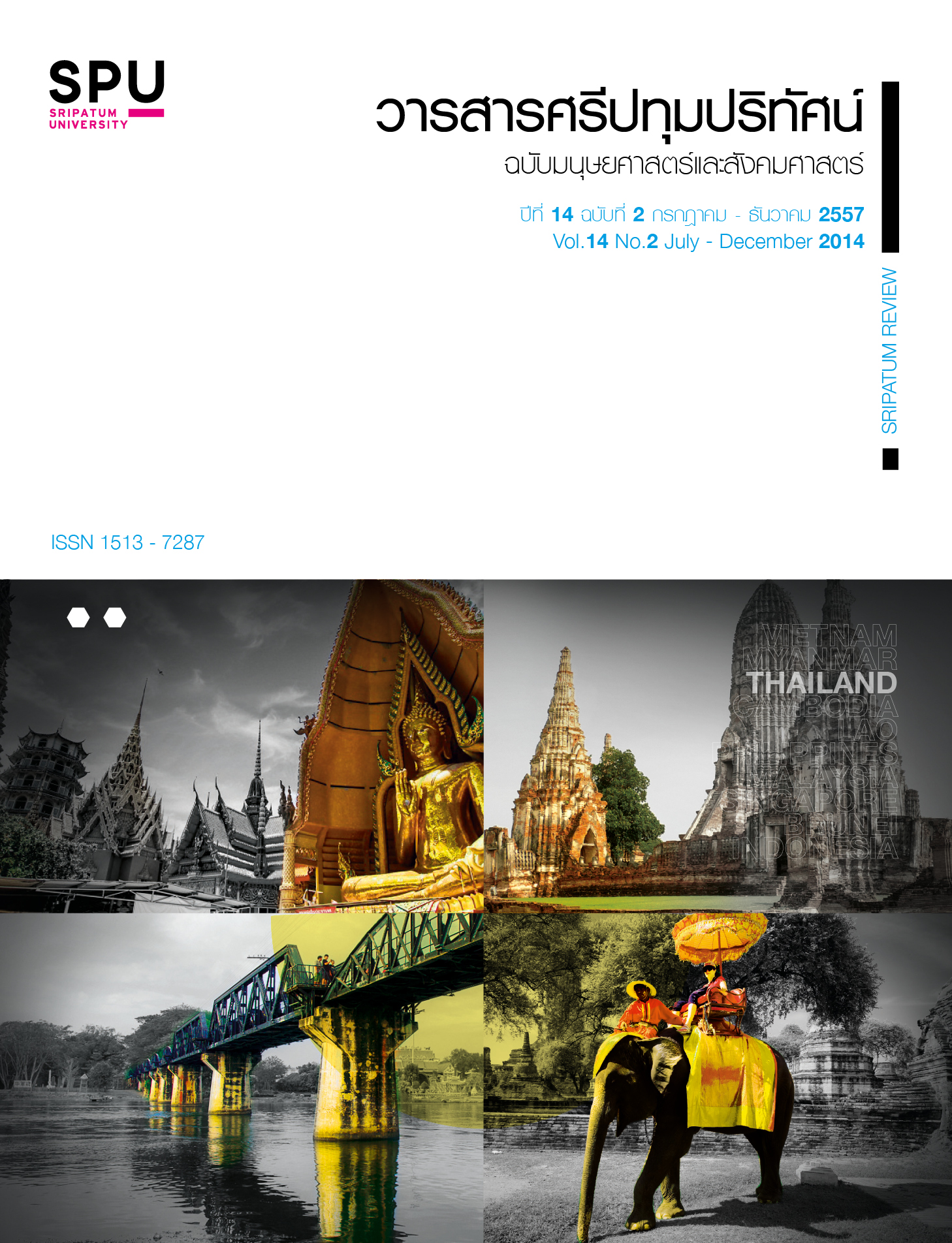Behavior of Support to be Environmentally Friendly Hotel
Main Article Content
Abstract
The hotel business is considered to be a very important business for economic development of the country and tends to expand further every year. However, this business plays its part in destroying the environment and has a relatively high level of natural resource exploitation in its operational process. Therefore, the hotel business has recently paid more attention to the importance of environmental problems, with actions taken via various approaches including promoting the awareness and participation behaviors of employees in the organization in solving and preventing environmental problems. This article aims to present the concepts of behaviors in support of being an environment-friendly hotel for organizations to apply in order to create an environment-friendly hotel in the future.
Article Details
1. กองบรรณาธิการสงวนสิทธิ์ในการพิจารณาและตัดสินการตีพิมพ์บทความในวารสาร
2. บทความทุกเรื่องจะได้รับการตรวจสอบทางวิชาการโดยผู้ทรงคุณวุฒิ แต่ข้อความและเนื้อหาในบทความที่ตีพิมพ์เป็นความรับผิดชอบของผู้เขียนแต่เพียงผู้เดียว มิใช่ความคิดเห็นและความรับผิดชอบของมหาวิทยาลัยศรีปทุม
3. การคัดลอกอ้างอิงต้องดำเนินการตามการปฏิบัติในหมู่นักวิชาการโดยทั่วไป และสอดคล้องกับกฎหมายที่เกี่ยวข้อง
References
ณัฏฐพันธ์ เขจรนันทน์. 2551. พฤติกรรมองค์การ. กรุงเทพมหานคร: บริษัท ซีเอ็ดยูเคชั่น จำกัด (มหาชน).
เทพนม เมืองแมน และ สวิง สุวรรณ. 2529.พฤติกรรมองค์การ. กรุงเทพมหานคร: บริษัท สำนักพิมพ์ ไทยวัฒนพานิช จำกัด.
มูลนิธิใบไม้เขียว. 2556. มาตรฐานโรงแรมเพื่อโลกสวย. (ออนไลน์). เข้าถึงเมื่อ 5 กรกฎาคม 2556.
วิวรรฒน์ พงศ์บูรณะกิจ. 2553. โรงแรมใบไม้เขียว: บริการที่เป็นมิตรกับสิ่งแวดล้อม.
วีรวรรณ วงศ์ปิ่นเพ็ชร์ และ ชลิดา วสุวัติ. 2554. การพัฒนาโมเดลความสัมพันธ์โครงสร้างเชิงสาเหตุของพฤติกรรมการอนุรักษ์สิ่งแวดล้อมที่มีผลต่อคุณภาพชีวิตของนักศึกษาระดับปริญญาตรี จังหวัดเชียงใหม่. วารสารพฤติกรรมศาสตร์เพื่อการพัฒนา. 3 (1), 145-158.
สำนักงานคณะกรรมการการอุดมศึกษา. 2555.คู่มือแนวปฏิบัติในการพัฒนาโรงแรมในเมืองให้เป็นมิตรกับสิ่งแวดล้อมพร้อมบริการที่เป็นเลิศ. กรุงเทพมหานคร: สำนักงานคณะกรรมการการอุดมศึกษา.
สุพัฒตรา สร้อยเพชร์. 2553. การจัดการโรงแรม. ขอนแก่น: สำนักพิมพ์มหาวิทยาลัยขอนแก่น.
สร้อยตระกลู (ติวยานนท์) อรรถมานะ. 2550. พฤติกรรมองค์การ: ทฤษฎีและการประยุกต์. กรุงเทพมหานคร: สำนักพิมพ์ มหาวิทยาลัยธรรมศาสตร์.
อรรถเวทย์ พฤกษ์สถาพร และคณะ. 2554. แนวปฏิบัติในการพัฒนาโรงแรมในเมืองให้เป็นมิตรกับสิ่งแวดล้อมพร้อมบริการที่เป็นเลิศ. กรุงเทพมหานคร: สำนักงานคณะกรรมการการอุดมศึกษา.
Golden, M. Robert. 1984. Longman Dictionary of Psychology and Psychiatry. New York:Longman Inc.
Green Globe. Standard Criteria and Indicators.(Online). Retrieved on July 5, 2013.
Green Key. Criteria-Hotel. (Online). Retrieved on July 5, 2013.
Green Hotel Association. 2013. “What is Green Hotel”?. (Online). Retrieved on July 5, 2013.
Kozar & Hiller. 2013. Socially and Environmentally responsible apparel consumption: knowledge, attitudes and behaviors. Social Responsibility Journal. 9 (2), 316-325.
Lusssier, N. Robert. 2008. Human Relations in Organizations Applications and Skill Building. New York: McGraw-Hill/Irwin.
Mintzberg, H. 1973. Industrial and General Administration. New York: Harper & Row.
Mondy. R. Wayne. & Noe. M, Robert. 2005. Human Resource Management. 9thed. pper Saddle River, NJ: Peason rentice Hall.
Robbins, S. P. & Judge T. A. 2008. Essentials of Organizational Behavior. New Jersey: Pearson rentics Hall.
Werner, M. Jon & DeSimone, L. Randy. 2009. Human Resource Development. South-estern: Cengage Learning.
Yeung, Slyvester. 2004. Hospitality Ethics Curriculum: an Industry Perspective. International Journal of Contemporary Hospitality Management. 16 (4), 253-262.
Zibarras, L. & Ballinger, C. 2011. Promoting environmental behavior in the workplace: survey of UK organizations. The department of Psychology, City University.
Zobel, A. & Burman, J.O. 2004. Factors of importance in identification and assessment of environmental management systems in selected industries in China. Journal of Cleaner Production. 21 (6), 13-27.


